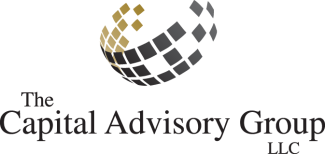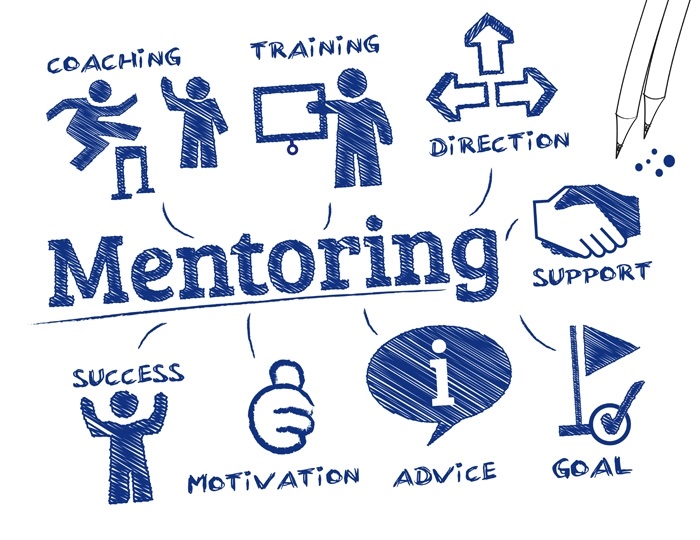
A Twenty Something’s Financial Guide: Finding Mentors
Question: Why is having a mentor better than going at it alone? See the answer at the end of the blog.
This is an excerpt form the book "A Twenty-Something’s Guide to Financial Freedom" (2015) — by Dr Henry H. Parker, Brett Machtig, & Josh Gronholz
“There is nothing new under the sun.”
—King Solomon
Even though King Solomon said that there is nothing new under the sun, each generation lives each stage of life as if they are the first to have encountered the problems they face. Blindly, each generation makes the same mistakes as the generation before, often at a staggering price. Dr. Henry Parker’s own experience highlights this below.
My own pursuit of a doctorate in classical Greek is a good example. One of the requirements for the degree was to pass a “sight translation” exam. My task was to translate into English, without the use of a dictionary, random passages from the entire corpus of Greek literature. I acted as if no one else had ever taken such an impossible exam; I said it was unfair, and in terror, put it off for seven years. I could have shortened this time, eliminated much anger and terror, and begun my career sooner, if I had asked an older student who had passed the exam to be my mentor. With a mentor, one doesn’t have to re-invent the wheel. With a mentor, one can attain goals many times faster, than by relying solely on oneself.
When we think of a mentor, we might imagine a smiling middle-class male helping an underprivileged child. The truth is that mentors are important for everyone, no matter what one’s socioeconomic status. A mentor should be one who has already achieved the specific goal you seek, and is willing to serve as your guide. A mentor is like the North Star, steering you in the right direction or a trail leader, guiding you along a path they have already been along. There are different kinds of mentors: parent mentors, academic mentors, romantic relationship mentors, sports mentors, entrepreneurial/business mentors, world-class mentors, and so on. They can be a positive role model or a negative role model. A positive mentor role model helps you get what they have. A negative mentor role model teaches you what not to do. Both can be very powerful.
Parent Mentors
Sometimes, our best lifestyle mentors are our parents. This was the case with Chris Choate, mentioned in chapter one. With his dad as his mentor, Chris started young in learning money management skills. The same is true of Michael Douglas, whose father Kirk, was his mentor. One of the main reasons that Michael is probably one of the most successful actors and producers today is the fact that his father was his role model and inspiration. Liza Minelli followed in the footsteps of her mom, Judy Garland. Calvin Klein probably would not be where he is today, had it not been for the inspiration of his grandmother, a dressmaker, and his mother, perhaps the most fashion conscious person in her community.
It is possible to be young and successful no matter what type of parents you have. They could be supportive, distant, or abusive. Supportive parents are good role models. Distant parents can show you the life you do not want for your family. Abusive parents can give you a powerful incentive to escape from a bad life.
Negative Mentors
In her award-winning book, Reviving Ophelia, Mary Pipher divides parents into three categories: supportive, distant, and abusive. An interesting paradox is that on the one hand, supportive parenting alone does not guarantee a child’s success in life, and, on the other hand, abusive parents do no ensure a child’s failure. Success in life is more due to one’s reactions to parents, than the actions of the parents. Epictetus, an early philosopher, wrote, “It is not the things that disturb us, but our judgment of these things”; meaning the event is less important than our perception and reaction.
When Brett was growing up, he was friends with two boys, brothers, who lived 4 houses down from him. The boys had a tough life at home because their father was an alcoholic and treated them terribly. When Brett reconnected with the two a few years back, he found one of the brothers was an alcoholic as well, stating that “Of course I’m an alcoholic, my father was one”. The other had never touched a drop because “Of course I haven’t, my dad was an alcoholic. The experience alone is not the determining factor of the future, it is what you learn and how you react that defines you.
Academic Mentors
While some mentors are inside the family, others, like academic mentors, are outside the family. A good mentor can make the difference between success and failure in college. As I was leaving the classroom one morning, I overheard two students talking: Witt, a 4.0 pre-med senior, recently accepted to medical school, was telling Antonio, a pre-med freshman, how to make the right moves to earn a 4.0 GPA. One of the most important moves was to select professors wisely. One professor, Witt said, does not believe any human is good enough to earn an A, and he constructs his tests to fulfill his belief. “Stay away from him,” Witt warned; he’s caused many brilliant pre-med students to get their first B in college.
Not only did Witt tell him the teachers to avoid, but gave him the names of those whose classes to take, plus some of his class notes. In some cases, however, you can’t avoid a boring or unfair teacher, if no one else teaches the course. His way to make such a situation endurable, Witt said, is never enroll in a class without first getting the lecture notes from a past student where possible, and knowing about the teacher’s style. What Antonio learned from Witt as a mentor, would have taken Antonio years to learn on his own, and he would have received some low grades as part of his learning process. Antonio sailed through college, and was accepted at four medical schools.
To make your college years flow as smoothly as possible, find an academically successful senior in your major, and ask him/her to be your mentor. Also, the senior might know a graduate student, whom you should have as a mentor, too. Finally, you will be given an assignment later to spend a day with a professional in your field. This will give you three mentors at three levels of growth. With these people in your corner, your pathway to success will be smooth.
As a follow up to that, when you find yourself in a position to become a mentor for someone else, feel honored and eager to help. Providing the path for others to succeed is incredibly rewarding and can serve as a “pay it forward” for those that helped you.
Sports Mentors
Behind almost every sports hero is a parent, coach, or older friend, who guided him or her in the right direction. Frank Gifford, legendary football player, Hall of Famer, and sports commentator, was going nowhere until a coach pulled him aside, told him what a beautiful future he could have, and trained him to attain it.
Sports mentoring is so sophisticated that some companies produce programs that simulate the exact movements of every muscle in a top athlete’s body, as she or he is hitting a golf or tennis ball. The viewer can then practice making the same kinds of movements to develop championship form. In this way, the viewer learns to make herself a muscular and neurological copy of the champion. Having a sports mentor is so important, because proper form is extremely important, and without it, performance will be limited.
Even if you aren’t in sports, there’s much you can learn from this field. One of the most important lessons sports teaches is to “ignore past failures and forge ahead,” as Dr. Maxwell Maltz says in his classic book, Psycho-Cybernetics. In football, if an end drops a pass in the first quarter of the game, and worries about it for the next 60 minutes, he probably won’t make one catch during the whole game. If he puts his mistake out of his mind immediately, refuses to feel sorry for himself and feel like a failure, probably he’ll have a good day. That’s a key lesson, to know that failing at a task doesn’t make you a failure, and to know you can bounce back and win no matter how many times you drop the ball.
Business Mentors
Of all the mentors listed, the business mentor can be the most important in terms of reaching financial freedom. Business mentors are valuable for starting a new business because it is such a hard task. In fact, 97% of all new businesses fail. A business mentor can help avoid failure by knowing the business cycle and details involved—details that can make the difference between failure and success. Business mentors are also valuable to those just starting their career; so valuable, that some companies have a mentor program involving senior executives and entry-level personnel. The student who has a mentor will be years ahead of her peers who do not.
World Class Mentors
World-class mentors are important because they can help you acquire standards of excellence that are true
anywhere on Earth. Every field has such mentors, who are at the top of their game, and internationally recognized. Mentors like these can teach you the true meaning of quality and provide a scale by which to judge what is poor, mediocre, or excellent, from a world-wide perspective. When Brett wrote his first book, Wealth In A Decade, he found several mentors who had success in both publishing and speaking. These mentors helped him find agents, and one wrote his forward and made back-cover comments. They saw Brett’s success as part of their own. Also, in the financial field, Brett acted as my mentor; he helped me achieve my personal financial success.
The World Of Pretenders
The reason you need a world class mentor is that in some communities whether they be schools, workplaces, or any other, mediocrity passes for excellence, and superficiality masquerades as profundity. When a new employee or associate comes along who is more talented than they, they work hard to discredit and destroy him or her. Why? Because true excellence would expose their mediocrity. Many talented people crumble under the constant putdowns by these pretenders. However, if the new person has known a world class mentor, pretenders cannot intimidate her, because she knows what true excellence is.
For many years I taught at a small mid-western school that began as a teacher’s college, and later became a university. It was the smallest of the three state universities, and had the least funding, the poorest facilities, and the least challenging criteria for hiring faculty. However, a small number of faculty leaders spent their entire academic lives trying to convince the Board of Regents and new faculty members that they were equal in quality to the faculty at the world class Big 10 University 70 miles away. Based on their résumés, most of these professors couldn’t qualify for a job at the school they claimed to be equal to theirs.
Sometimes pretenders are young. Dick was a high school superstar from Chicago, making 26 touchdowns in his freshman year and 30 the next. Fame made him arrogant and uncooperative in school.
During his junior year, Dick met “Big Daddy,” a college All-American, who went on to play for the New York Jets. In his cocksure manner, Dick told Big Daddy how certain he was of becoming a professional football player. Big Daddy looked at him and laughed. “Hey, brother, you’ve got an attitude. Who do you think you are? You’re just 5 ft.6, and 160 pounds. Don’t you know there are 6 foot 3”, 210-pound backs at Florida State who can run faster than you, and who are honor students? You’re living in a dream world.”
Because Dick hadn’t had a world-class mentor, he thought excellence in his league was the same as excellence in the country. In his senior year, Dick was suspended from school for poor grades. Today he stocks merchandise at a department store.
How To Find Mentors
Professional mentors are relatively easy to find in the community, because many are flattered when enthusiastic students show an interest in their work. Some students seek the help of their parents, or parents’ friends, or their church, or the alumni office of their school in finding mentors in their field. Retirees also are very likely to consent to becoming mentors.
Spending a Day with a Professional in Your Field
After a potential mentor has been contacted and an appointment is made, prepare yourself so you will make a good impression. Begin by researching the company, or the person, to learn as much background information as possible.
On the day of the interview, dress conservatively, enter the office enthusiastically, shake hands firmly, and thank the person for his/her time. Be sure to look at pictures on the desk, and plaques on the wall. Pictures on the desk usually are of people your interviewee cares about the most. You can break the ice by asking discretely about people in the pictures, “Are those your children?” “Is that your wife?” If the interviewee gives off signals that the question is out of line, smile, nod, and move on, possibly to the following questions, or others you have:
- I know what your position’s title is, but what is your job really like?
- What are your specific responsibilities?
- When did you start with the firm, and what was your career path?
- What are the greatest challenges you have faced and overcome in getting a job?
- Are there current challenges you have not overcome yet?
- I have read about your company’s history, but , if you don’t mind, I would like to hear you describe how it began, where it is now, and most importantly, where do you see it going?
- What type of social status does your job give you now, different from when you started?
- What type of education is important for me to be successful and get a job in this field?
- Do you have any suggestions about what schools or classes I should attend and or graduate?
- What summer jobs would you recommend to help prepare me for this field?
- What career conferences do you attend? Are there any I should attend?
- Are there outside activities to help me prepare for this field?
- Can you give me an idea of the salary range I can anticipate when I start in this field?
- Approximately how much can I expect to make after my first five years?
- Approximately how much could I expect to make after 10 years?
- Approximately how much could I expect to make after 15 years?
- Approximately how much could I expect to make after 20 years?
- Approximately how much could I expect to make after 25 years?
- I am very impressed with what you have accomplished, and I’d like to know your life history. For example, what was your college background like? How did you get this job?
- What was high school like for you?
- In respect to education, what is your philosophy of success?
- In respect to a job, what is your philosophy of success?
- I’m __ years old, and I’d like to be a success like you. I’m going to write a plan for success, based on what I have learned from you. Would you have time to critique it for me? Who else should I interview? Can you make an introduction?
This question ends the interview. Thank the person, shake hands, and say how inspiring the interview was. The rest of the day should be spent touring the facility, and, if permitted, watching the professional at work. Afterward, write a thank-you letter promptly and enclose your plan asking him to review it and offer suggestions. After your critiqued plan is returned, ask if s/he will be a mentor.
The Benefits of This Experience
When I first gave this assignment, my single goal was to help my students discover if they had chosen the right major. Their experience of spending a day with a professional brought benefits I never imagined. Many of them made such an impression, that they were offered internships or part-time jobs during the school year, full-time jobs in the summer, and promises that the professional would write letters of recommendation when they applied for graduate school or jobs after graduation.
Erica
Erica came to the university to major in broadcast journalism, sure that she wanted to be a radio announcer. After spending a day with a radio announcer, she came back to class and told me the experience bored her to death, and asked permission to spend a day at a TV station, and loved it. She made such a good impression on the station manager, that he offered her a part-time job during the school year. If Erica hadn’t had that experience in her freshman year, she could easily have spent two or three years in a field she disliked.
Jared
Jared declared a major in pre-medicine. In his freshman year, he spent a day at a small town hospital, and enjoyed the experience enormously and returned to class certain that he wanted to be a physician. Within a short time, the personnel director at the hospital called him back and offered him a part-time job because he was impressed by his warm personality, intelligence, and willingness to work. Today Jared is a senior, he has worked at the hospital for three years, he knows every physician there, he has broad hands-on experience in many hospital departments, and he’s making an hourly wage much higher than most of his college friends. When he applies to medical school, his résumé will show four years of hospital experience. Jared told me that he feels like a doctor already.
Danielle
When she was 18, Danielle spent a day with a dentist, and enjoyed it very much. Her report written about her day with the professional was the best submitted that year. When she became a senior, she asked me to write a letter of recommendation to be sent to several schools of dentistry. In my letter, I mentioned her award-winning report and said that, in her mind, she had become a dentist at age 18. Today she has a successful dental practice in Nashville.
All of these examples show the advantages of having a mentor. Like a genie, a mentor can open your mind and prepare you for a world you haven’t experienced. A mentor opens inaccessible doors. On the shoulders of your mentor, you can touch the stars.
Finally, here is an actual report written after a student spent a day with a professional who later became her mentor:
My Visit with a Professional, by Manika Sharma
For one day, I was able to see what it would be like to be an ophthalmologist. When I visited the doctor, he saw 10 patients, and performed one vision-correction surgery. I was fortunate to be able to watch this operation which, in coming years, will eliminate the need for most eyeglasses. The doctor told me that every patient who comes into the clinic is a challenge, and every person who walks out with better vision, or at least peace of mind, is a success. Everyone is significant, because they are human. “We don’t always need our eyes to see when a person is in need, we have our hearts to tell us that,” he said.
Shadowing the doctor has strengthened my determination to become an ophthalmologist. After seeing the look of admiration his patients gave him, I knew that I have chosen a well-respected field. Giving people a chance to improve their vision is my way of helping humanity. To achieve this dream, I will have to work hard during medical school, then continue on through my residency program. Everything else will be put on hold, because in this competitive field, it is all or nothing. The doctor said, “Keep your goals high and reach for the stars; you just might grab a piece of heaven. Follow your heart and your dreams.
(Ms. Sharma is now a physician).
Answer to the Question: Why is having a mentor better than going at it alone?
The best way to answer the question is to break it down into these points:
- Having a mentor keeps you from having to re-invent the wheel.
- A mentor’s knowledge helps you attain the goal in a fraction of the time it would take by doing it on your own.
- There are many types of mentors that one should use—parents, academic, business, sports, etc.
- It is easier to find a mentor than one might imagine, because most professionals are flattered by students who are eager to learn from them.
- Although some mentors are world-class, one can learn much from unknown people who are competent in their field.
- World-class mentors help you to develop standards of excellence that are sound and comprehensive.
- The mentor’s job is to give advice; your job is to do the work and learn from the experience. Be grateful that the mentor is giving you his or her time, and don’t ask for favors.
- Don’t expect your mentor to make you successful. The burden rests on your shoulders. Work hard and make it easy for your mentor to help you along the path to success.
Information without action is just a waste. We have exercises available to go along with this article that can help kick off the planning process.
by: Dr Henry H. Parker, Brett Machtig, & Josh Gronholz
# # #
We Can Help.
If you want a review of your situation, we will do it for free. The Capital Advisory Group Advisory Services is an asset manager that helps guide wealth accumulation and management. Our team helps executives, retirees, and business owners with financial planning, asset management, tax guidance, risk mitigation, and estate planning. We help clients create wealth by analyzing income, cash flow and taxes with the goal of each becoming great savers. We scrutinize what can derail the plan. Finally, we help clients grow into investors with realistic expectations, giving them strategies to reduce the impact of market downturns and helping them create plans to meet their future income and asset objectives.
As a Registered Investment Advisory (RIA) firm, we are held to the highest standard of financial service firms. We are held to the “fiduciary” standard of care. The Center for Fiduciary Studies states that: “Advisors held to the fiduciary standard must employ reasonable care to avoid misleading clients and must provide full and fair disclosure of all material facts to your clients and prospective clients.”(1)
According to the SEC, “advisors held to the fiduciary standard have a fundamental obligation to act in the best interests of the clients and to provide investment advice in the clients’ best interests. Under the fiduciary standard, advisors owe clients undivided loyalty and utmost good faith.”(2)
We take our fiduciary standard very seriously at The Capital Advisory Group Advisory Services. We search for ways to better our clients’ current and future financial situation. We want the best for you and your family.
The Capital Advisory Group Advisory Services uses independent research to identify low-cost investment options, as high fees have an adverse impact on returns. We analyze fees and fund performance using programs like Fi360 to select better investment options and doing side-by-side peer comparisons improve results.(3)
Our Approach
Our goal is to help avoid you expensive financial lessons and become your “Personalized Chief Financial Officer.” The philosophy we have is to take our three decades of client and personal financial experiences and apply workable solutions to help you better manage your financial needs. We are an independent group with no proprietary investment products or sales quotas.
We are a fee-for-service advisor. We have found that just commission-based asset management can be an obstacle that may not always work in your best interests.
Our approach rewards us over time, where we have to earn our relationships every day. Our fees vary depending on portfolio size, type of assets, and asset management style. Because our fee-based compensation increases only if portfolios grow, our interests are aligned with yours. We focus on financial objectives and your future growth.
Our Investment Process
Before we develop a personal investment strategy, we take a hard look at where you are currently. We assess investment goals, available resources, desired rate of return, and risk tolerance. Our research allows us to customize a plan to help fit your individual needs and develop your unique “Investment Policy.” Once the blueprint is in place, advisors provide personalized investment advice. We allocate assets in a way that is intended to enable you to obtain an expected return for a specific level of risk. We believe that asset allocation is responsible for more than 90 percent of the variations in investment portfolio performance – so choosing the right asset allocation for you is our top priority. Each of our models is actively managed and back-tested to help manage risk.
Along the way, we monitor your progress including client statements and reports that summarize investment activity and compare your current portfolio results to your goals. We make periodic adjustments to re-balance your portfolio, adjusting our strategies to fit your individual needs. Through-out, we maintain constant vigilance over market awareness with our investment committee. Thank you, and please give us your feedback. We can be reached at 952-831-8243.
About the Authors:
Brett Machtig has authored several books and is the founding partner of The Capital Advisory Group, a private asset management and retirement planning services firm located in Bloomington, MN. Their firm manages more than $400 million in assets for 83 institutions and about 850 families as of December 31, 2014. He has been helping affluent investors execute financial strategies, meet income objectives and realize life visions for more than 30 years. Approachable, genuine and down-to-earth, Brett holds himself to a high standard of accountability and seeks to achieve positive financial results on behalf of each client. In this article, Brett shares the effectiveness of each strategy and how to improve it.
Josh Gronholzgraduated Summa Cum Laude from the University of Minnesota’s Carlson School of Management and is a Registered Asssitant. He has worked in asset modeling with The Capital Advisory Group Advisory Services and has spent the bulk of his career modeling various investment scenarios and assisting individuals along their way to financial success and personal wealth.
Henry H. Parker Dr. Parker, a Ford Foundation Fellow, is presently a Cunningham Distinguished Professor at the University of Tennessee, Martin, where he taught and field-tested A Twenty-Something’s Guide to Financial Freedom for 10 years prior to its publication. He graduated magna cum laude from the University of St. Thomas. He received the M.A. from the U. of Minnesota, Minneapolis, and the Ph.D. from the U. of Illinois, Champaign-Urbana. HIs most recent publication is, Apollo vs. Dionysus, 2014. Dr. Parker has been featured on, “The Oprah Winfrey Show,” and his work has been included in The New York Times, USA Today, and People Magazine. He has been a speaker on the national lecture circuit for the New York-based agency, Program Corporation of America. Henry H. Parer is not affiliated with The Capital Advisory Group Advisory Services or United Planners Financial Services.
We can be reached at bretmachtig.com or cagcos.com; 952-831-8243 or bmachtig@machtig.net or jgronholz@machtig.net.
Source:
(1) finra.org/web/groups/industry/@ip/@reg/@notice/documents/noticecomments/p118980.pdf as of 8/2014
(2) www.sec.gov/divisions/investment/advoverview.htm as of 8/2014
(3) www.fi360.com/products-services/tools-overview, as of 8/2014, Results not guaranteed.
The information contained does not constitute an offer to buy or sell securities and is provided for illustrative purposes only. The information comes from reliable sources, but no guarantees or warranties are given or implied to its accuracy or validity. The strategies listed do not necessarily reflect those of its publisher, MGI Publications or its authors. Information obtained from publicly available sources listed herein and footnoted where applicable. Securities offered through United Planners Financial Services of America, a Limited Partnership, 480-991-0225 member FINRA/SIPC, 7333 E Doubletree Ranch Rd, Scottsdale, AZ 85258. Advisory Services offered through The Capital Advisory Group, LLC 5270 W. 84th Street, Suite 310, Bloomington, MN 55437, 952-831-8243, an independent registered investment advisor, not affiliated with United Planners Financial Services of America. ADV, Part 2A as of 3/26/2015, available upon request. Many investments are offered by prospectus. You should consider the investment objective, risks, and charges and expenses carefully before investing. Your financial advisor can provide a prospectus, which you should read carefully before investing. An investment in a money market fund is not insured or guaranteed by the Federal Deposit Insurance Corporation (FDIC) or any other government agency. Although a money market fund seeks to preserve the value of your investment at $1.00 per share, it is possible to lose money by investing in a money market fund. Diversification does not guarantee a profit or protect against loss. Please consult your attorney or qualified tax advisor regarding your situation. Asset allocation and rebalancing do not guarantee investment returns and do not eliminate the risk of loss.





